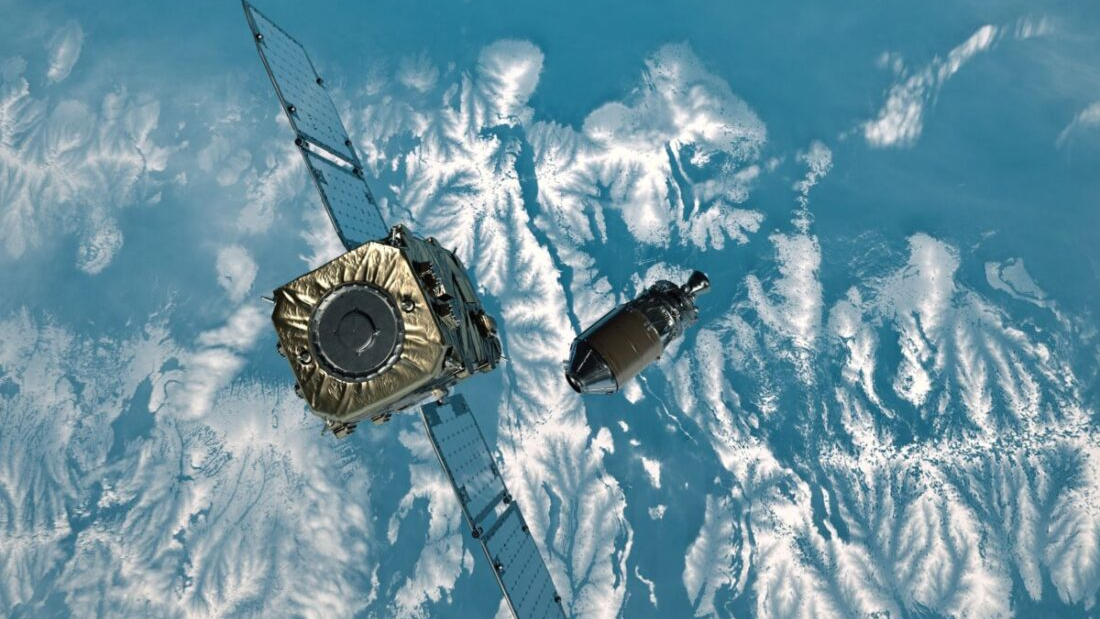Private space-junk probe to conduct up-close inspection of spent rocket stage
Spacecraft closes in ahead of planned fly-around of spent rocket stage.

Breaking space news, the latest updates on rocket launches, skywatching events and more!
You are now subscribed
Your newsletter sign-up was successful
Want to add more newsletters?

Delivered daily
Daily Newsletter
Breaking space news, the latest updates on rocket launches, skywatching events and more!

Once a month
Watch This Space
Sign up to our monthly entertainment newsletter to keep up with all our coverage of the latest sci-fi and space movies, tv shows, games and books.

Once a week
Night Sky This Week
Discover this week's must-see night sky events, moon phases, and stunning astrophotos. Sign up for our skywatching newsletter and explore the universe with us!

Twice a month
Strange New Words
Space.com's Sci-Fi Reader's Club. Read a sci-fi short story every month and join a virtual community of fellow science fiction fans!
A space-junk removal satellite launched for Japanese company Astroscale has completed rendezvous maneuvers with its target and is commencing a proximity operations phase in which it will approach the other spacecraft.
The Active Debris Removal by Astroscale-Japan (ADRAS-J) satellite launched on a Rocket Lab Electron rocket on Feb. 18. It aims to get up close and analyze a Japanese H-2A rocket upper stage that launched the GOSAT Earth observation satellite in 2009, and in doing so, test technologies and operations for approaching and monitoring debris objects
ADRAS-J is now within several hundred kilometers of its target and has started using Angles-Only Navigation, a navigation method to estimate relative position and velocity through the spacecraft on-board cameras.
Related: Rocket Lab launches ADRAS-J space junk inspection satellite for Astroscale (video)
The company states that the test is a major milestone in the mission objective of demonstrating rendezvous and proximity operations (RPO).
"Starting Angles Only Navigation is a huge milestone for the ADRAS-J mission, highlighting the expertise and teamwork among Astroscale teams in Japan, the UK, and the U.S.," said Eijiro Atarashi, ADRAS-J Project Manager at Astroscale Japan, in a statement.
"This brings us one step closer to further advancing our RPO capabilities and our understanding of space debris, reinforcing our commitment to the sustainable development of space."
Breaking space news, the latest updates on rocket launches, skywatching events and more!
ADRAS-J is currently in a 347 x 383 miles (558 x 617 kilometers) orbit. Following the proximity approach phase, ADRAS-J will attempt to execute a fly-around of the 11 meters long and four meters in diameter [36 by 13 feet] upper stage, capturing crucial images and data to assess the rocket body's movement and condition of the structure, according to Astroscale.
The 330-pound (150 kilograms) spacecraft is part of an orbital debris removal program backed by the Japan Aerospace Exploration Agency (JAXA) for Phase I of its Commercial Removal of Debris Demonstration program.
The data and operations experience from ADRAS-J aims to assist the later removal of spunk junk, an issue that threatens the sustainable use of orbital space above the Earth.
Astroscale was founded in 2013 and has subsidiaries in the United Kingdom, the United States, France and Israel. Its future plans include launching its End of Life Services by Astroscale-Multiple (ELSA-M) vehicle to dock with a satellite and remove it from orbit.

Andrew is a freelance space journalist with a focus on reporting on China's rapidly growing space sector. He began writing for Space.com in 2019 and writes for SpaceNews, IEEE Spectrum, National Geographic, Sky & Telescope, New Scientist and others. Andrew first caught the space bug when, as a youngster, he saw Voyager images of other worlds in our solar system for the first time. Away from space, Andrew enjoys trail running in the forests of Finland. You can follow him on Twitter @AJ_FI.
